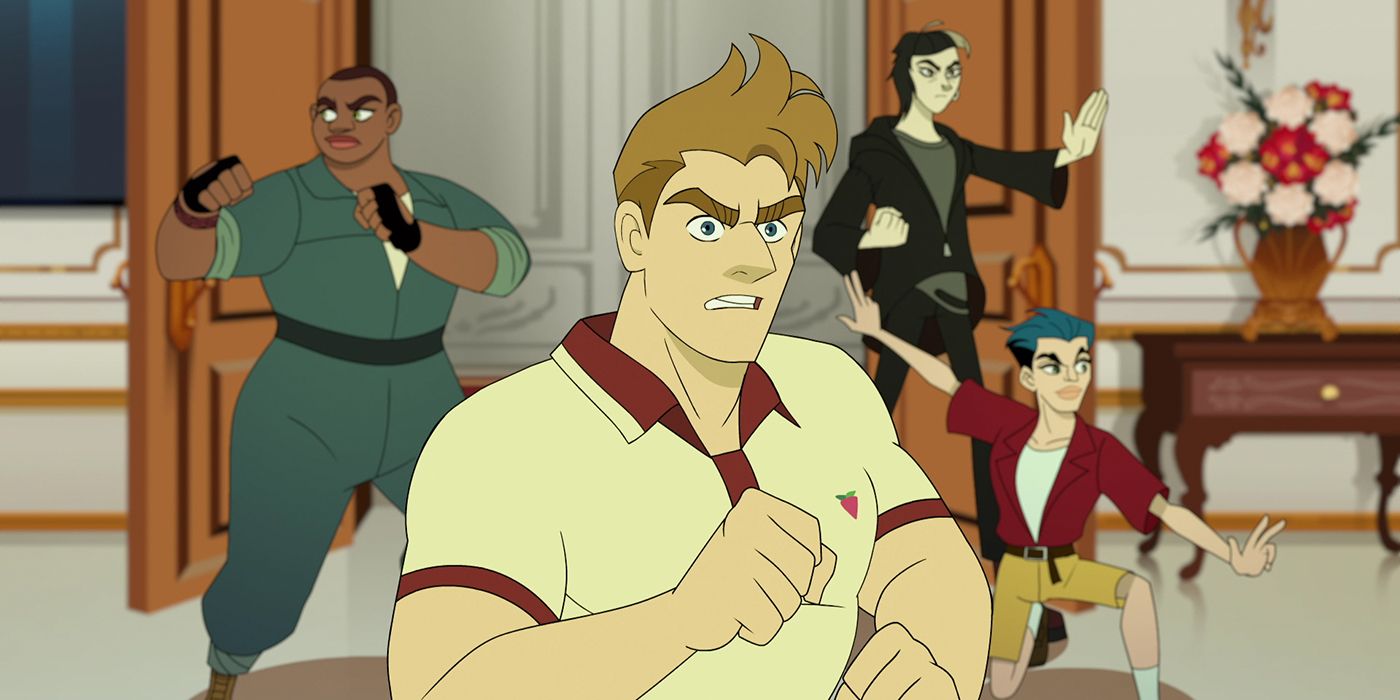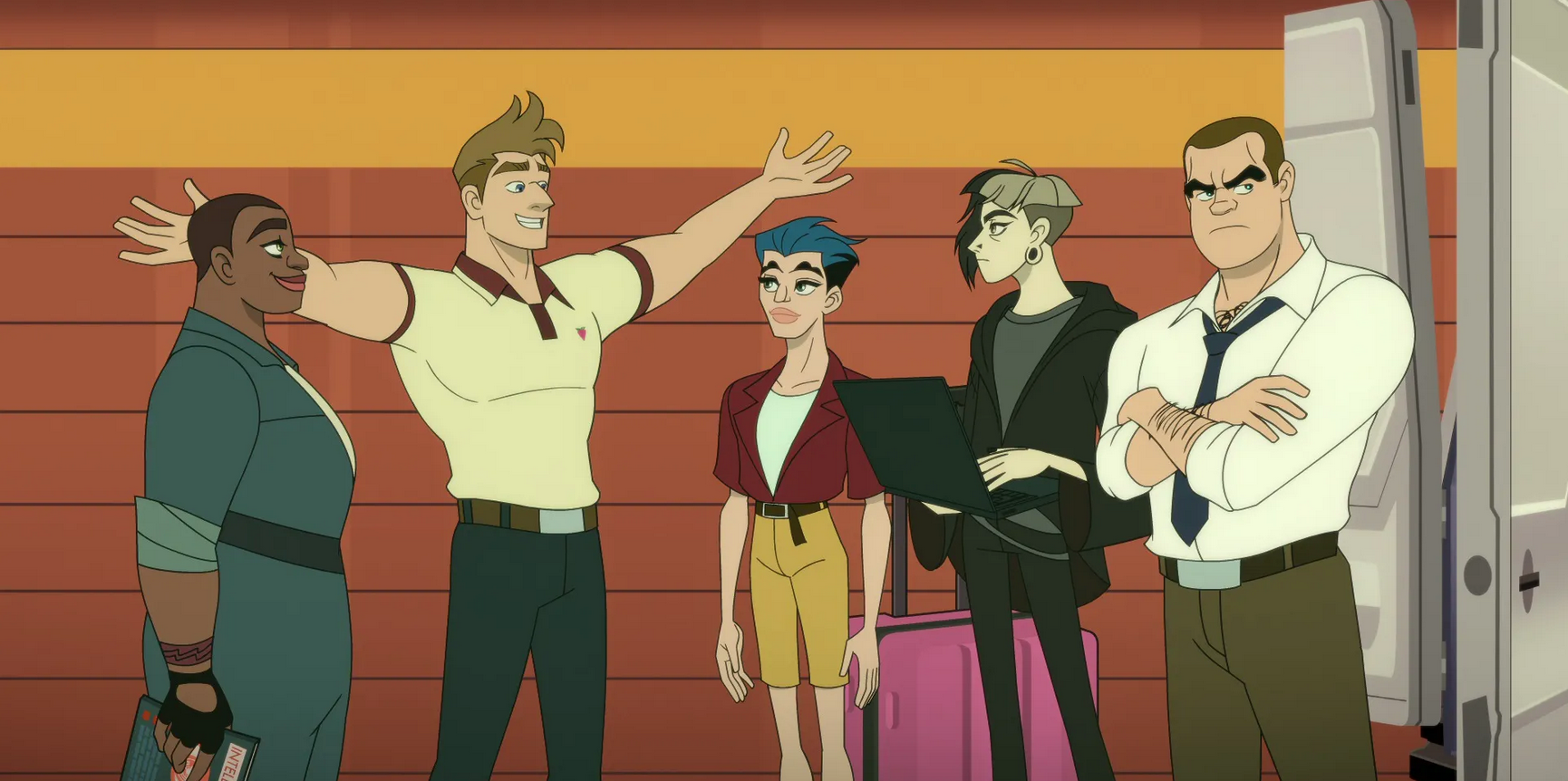
Q-Force would be a lot easier to review had it turned out to either be surprisingly great or as bad as the internet assumed it would be after its first trailer dropped. It's harder to write about a show that didn't deserve the preemptive hatred it received but doesn't deserve much praise either. This LGBTQ+ spy cartoon absolutely has its heart in the right place and has little that could offend any adults in the queer community. Unfortunately, it's also not very funny.
The story starts in 2011, shortly after the repeal of Don't Ask, Don't Tell. Agent Steve Marywhether (Sean Hayes) is about to get a big promotion at the American Intelligence Agency, the show's fictional substitute for the CIA and FBI, but when he comes out as gay, his homophobic boss Dirk Chunley (Gary Gole) demotes "Agent Mary" and gives the promotion to straight Agent Rick Buck (David Harbour). 10 years later, Mary and his crew of queer spies -- the mechanic Deb (Wanda Sykes), hacker Stat (Patti Harrison), drag queen Twink (Matt Rogers) -- are stuck in West Hollywood; but, when they uncover a terrorist plot, Mary's AIA mentor V (Laurie Metcalf) gives the "Q-Force" the opportunity to save the world.

Q-Force itself feels like it's coming out 10 years later than it should have. The pop-culture parodies lean towards movies from the 2000s like Brokeback Mountain and The Princess Diaries, and any show in 2021 where a drag queen praises Harry Potter and there isn't any joke afterward about J.K. Rowling's transphobia immediately feels like a relic. The show's politics mostly hold up and depicts some solid running gags about the corporatization of Pride. Yet, what might have felt boldly progressive in the Obama era is now feels a bit obvious.
An animated show made over the course of two years is going to be limited in terms of topicality; although, somehow, the show is up-to-date enough to describe "the nipple cut of Cats," which only became public knowledge in July. However, it is noteworthy how much of Q-Force's attempts at humor are based on throwing out references and buzzwords. Creator Gabe Liedman has written hilarious episodes of shows like PEN15 and Broad City, and producer Michael Schur has helmed hits from The Office to Brooklyn Nine-Nine, so it's fair to ask, How did Q-Force end up so flat comedically?
Part of the issue is that Q-Force is the first animated show many of the writers and producers have worked on together. Schur's past sitcoms were heavily reliant on the interaction of the cast to sell the jokes. With Q-Force, the actors can't interact. While most animated shows record actors separately, the performances in Q-Force feel extra walled off from one another compared to the voice acting in other cartoons. That walled-off sensation contributes to the show's ensemble never fully cohering. It's easy to imagine people becoming fans of specific characters without actually loving the show itself.

The individual characters are a mixed bag. Agent Mary is okay in terms of the serious aspects of the plot but isn't a particularly funny or distinctive. Anything with the obnoxious straight guys, Rick and Dirk, is tiring. Wanda Sykes manages to carry a lot of comedic heavy lifting as Deb. While Deb's lines aren't that much cleverer than anyone else's, Sykes' delivery makes everything she says funnier. Stat is by far the most interesting character, funny and nuanced with a genuine mid-season love story. There should have been more of her.
Then there's Twink, the character whose introduction in the trailer caused the most controversy. In the context of the show, as just one gay archetype amongst many gay characters, he's not really offensive. He is, however, a shallow character. As a team member dedicated to a few stereotypical interests and zero working knowledge of anything else, he's clearly meant to serve a similar buffoonish role to Jason in The Good Place. However, whereas The Good Place built empathy and understanding for Jason, Twink is one-dimensional.
Q-Force is watchable but mediocre, with a few positive highlights. It's much stronger story-wise than its pre-emptive haters would have expected and its sex-positivity is refreshing. But, in terms of comedy and relevance, it's a show that feels like it's operating at half capacity. If it gets a second season, there are enough germs of interesting ideas that it could get better, but it's questionable whether Q-Force will actually hold viewers long enough to continue.
Q-Force premieres on Netflix Sept. 2.
0 Comments